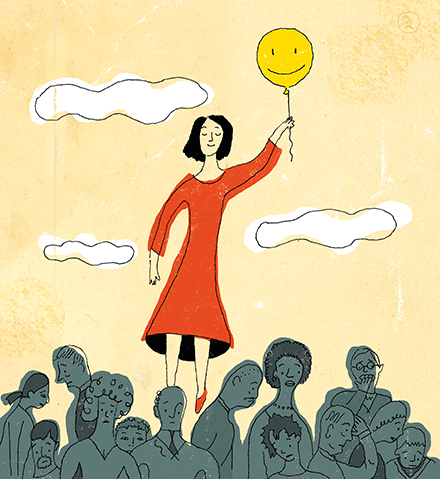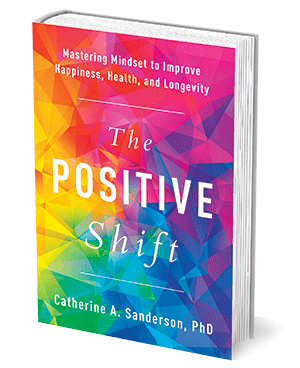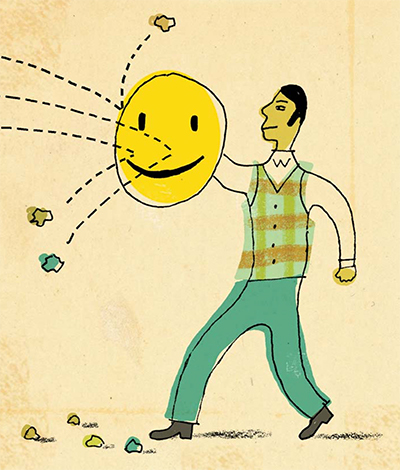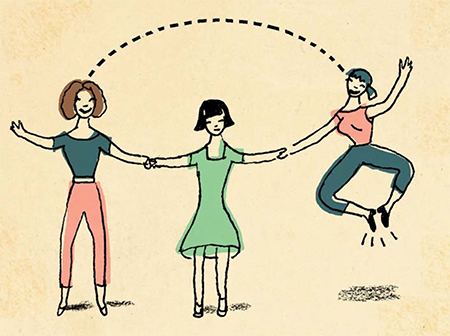You probably already know that happiness, like the flu, is contagious. Many of us have friends and loved ones who always seem to be in a good mood, and spending time with them lifts how we feel.
One of the clearest studies to demonstrate this effect of other people’s happiness on our own happiness examined data from a large social network study. Researchers in this study had gathered data from more than 5,000 people living in Framingham, Mass., over a 32-year period (1971 to 2003). Although the study was designed specifically to measure risk factors related to heart disease (obesity, smoking and alcohol use), the researchers had also asked participants about their “social ties.” These social ties included relatives, friends, coworkers and neighbors living close by. (Remember, this study was started in 1971, before people could rely on cell phones, email and texting to stay in good touch with those who lived far away.)
The findings from this social network analysis clearly indicate that happiness is contagious. Specifically, people who are surrounded by many happy people show increases in happiness over time. For example, a happy friend living within a mile of a person’s home increases that person’s happiness by 25 percent. Having a happy spouse, happy next-door neighbor or happy sibling (who lives within a mile) also leads to increases in happiness.
Having a friend who has a happy friend (even if your actual friend isn’t happy) increases your own happiness by nearly 10 percent.
What is perhaps even more surprising is that happiness can also be increased indirectly, meaning through broader connections within a social network. For example, having a happy friend increases your own happiness by about 15 percent. But having a friend who has a happy friend (even if your actual friend isn’t happy) increases your own happiness by nearly 10 percent. And even more distant connections can make us happy: having a friend who has a friend with a happy friend still yields us a 5.6 percent increase in our own happiness.
Although this social network analysis has focused on the advantages of having happy people in our social networks, these relationships can of course also work in the opposite way. You probably already know from life experience that being around people who are negative can make you feel worse. Think about who in your life makes you feel better and who makes you feel worse. Try to spend more time with those in the first group, whenever you can.
In a creative test of the power of negative experiences to spread within a social network, researchers in one study examined how unhappiness can spread through social media. In this study, researchers first evaluated both positive and negative emotions conveyed in people’s Facebook posts. Then they compared the frequency of these emotional expressions to the amount of rainfall in each poster’s city. As you might expect, people tend to post more negative emotions, and fewer positive emotions, on rainy days. In fact, in a large city, such as New York City, a rainy day leads to an additional 1,500 negative posts by those living in that city compared to on a non-rainy day.
But what is even more interesting about this study is that the researchers then examined how one person’s Facebook post could influence the expressions posted by friends in other cities. These findings again provide strong evidence for the power of emotional contagion within a network. In other words, having a friend post something negative on Facebook increases the likelihood of a negative post, and decreases the likelihood of a positive post, by one’s own friends. To return to the New York City example, a rainy day in New York City not only yields another 1,500 negative posts by those living in the city (and experiencing the rain) but an additional 700 negative posts by friends living elsewhere (and not necessarily experiencing rain).
Although you can’t always eliminate negative people from your life—a close family member, a neighbor, a coworker—you can make a deliberate attempt to spend more time with those who make you feel good, and less time with those who don’t. This strategy is particularly good advice for those of us who don’t naturally adopt a positive mindset. Remember my husband’s optimistic outlook about our daughter’s health, even as I was mired in worry and sadness? Perhaps you can see now why I chose to marry him!
© 2019 by Catherine A. Sanderson. Sanderson is the author of five psychology textbooks and a parenting book, and she speaks regularly on the science of happiness, the power of emotional intelligence, the mind-body connection and the psychology of good and evil. This semester she’s teaching “Close Relationships,” an upper-level psychology seminar.
Illustrations by: Marc Rosenthal




